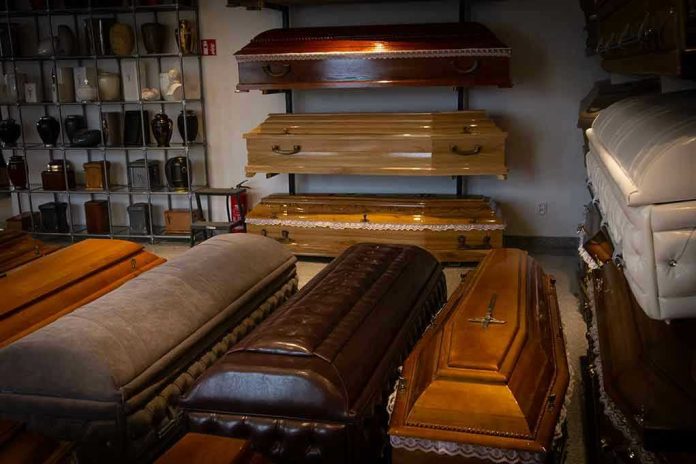
Colorado’s coroner scandal exposes a shocking abuse of public trust, where nearly two dozen bodies were hidden for up to 15 years inside a funeral home operated by an elected official—raising urgent questions about oversight, accountability, and the sanctity of family rights.
Story Snapshot
- Inspectors found 20 decomposing bodies concealed for up to 15 years at Davis Mortuary, run by Pueblo County’s sitting coroner.
- The discovery was triggered by Colorado’s new law mandating annual funeral home inspections.
- Families may have received fake cremains, intensifying outrage and calls for justice.
- Criminal investigation, license suspension, and renewed scrutiny of Colorado’s funeral industry now underway.
Regulatory Failures Enabled Serious Abuses
For decades, Colorado’s funeral home industry operated with minimal oversight, lacking routine inspections and clear qualification requirements. This regulatory vacuum enabled abuses like those uncovered at Davis Mortuary, where up to 20 bodies were hidden in a secret room behind a cardboard display, some waiting for cremation since 2010. The owner, Brian Cotter—who also serves as Pueblo County’s coroner—admitted that families may have been given fake cremains instead of the remains of their loved ones. The mortuary’s license was immediately suspended, and state investigators launched a criminal probe to address the misconduct.
Coroner’s Dual Role Underlines Conflict of Interest
The Davis Mortuary case stands out due to the involvement of a sitting county coroner, highlighting a dangerous conflict of interest. Cotter’s dual role as both public official and private funeral home operator may have shielded him from scrutiny, allowing unethical practices to persist unchecked for years. The Department of Regulatory Agencies (DORA) only gained the authority to conduct inspections after the recent passage of House Bill 24-1335, a direct response to earlier scandals. This new oversight led to the first annual inspection and the chilling discovery of decomposing bodies. The incident echoes previous Colorado scandals, but the direct involvement of an elected coroner intensifies calls for reform.
Impact on Families and Community Trust
The fallout from the Davis Mortuary scandal is immediate and severe. Families are experiencing emotional distress, grappling with the possibility that they received fake cremains and were denied proper closure for more than a decade. Funeral services in Pueblo have been disrupted, and the broader community is questioning the integrity of those entrusted with honoring the dead. The funeral industry faces reputational damage statewide, prompting demands for stricter regulations and transparency to restore trust. The emotional and economic consequences are significant, with lawsuits and criminal charges likely to follow.
Criminal Investigation and Policy Reform
Law enforcement agencies, led by the Colorado Bureau of Investigation and supported by local authorities, have taken charge of the criminal investigation. The mortuary remains closed, and Cotter, along with staff, has declined public comment. A press conference has been scheduled to address the findings and outline next steps. As details emerge, the scandal is expected to drive further regulatory reform in Colorado and potentially influence national standards for funeral home oversight. Experts and advocacy groups insist that independent oversight is essential, especially when public officials are involved in private business, to protect families and uphold ethical standards.
Colorado funeral home investigated after 20 bodies found decomposing, some for over a decade, behind hidden door https://t.co/vLujyj7ukf pic.twitter.com/3LDmMAcWf9
— New York Post (@nypost) August 22, 2025
Sources:
Colorado Coroner Accused of Hiding Bodies Inside the Mortuary He Owns
Colorado funeral home investigated after decomposing bodies found
Colorado funeral home decomposing bodies years old
Colorado investigators discover decomposing bodies funeral home Pueblo County Coroner
Bodies found hidden Pueblo County Coroner Davis Mortuary Funeral Home



